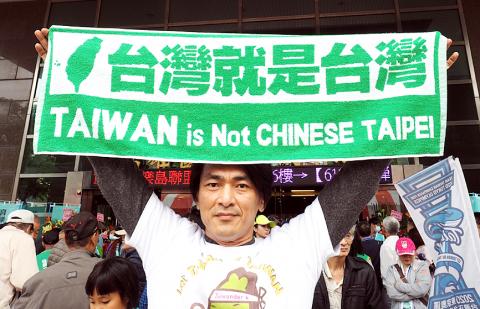Groups participating in international events should avoid using the name “Chinese Taipei,” which could be twisted to mean that Taipei is a part of China, the Ministry of Foreign Affairs said.
In guidelines published on Monday last week, the ministry said non-governmental organizations (NGOs) should prioritize using the nation’s official title, the Republic of China, or use the name “Republic of China (Taiwan)” when participating in international events.
The name “Taiwan” is also acceptable in circumstances under which the official title cannot be used, the ministry said.

Photo: EPA-EFE / DAVID CHANG
Titles that demote the nation’s status — such as “Taiwan, Province of China,” “Taiwan, China,” “Taipei, China” or “Chinese Taiwan” — are unacceptable, it said.
If NGOs are unable to use the preferred titles, they could recommend that event organizers refer to all participating nations, teams or groups with the names of their cities or organizations, it added.
The use of the name “Chinese Taipei” should also be avoided due to Beijing’s efforts to promote it as Zhongguo Taibei (“China Taipei,” 中國台北) in Mandarin, the ministry said.
If NGOs must use the name “Chinese Taipei” as their membership name, they should endeavor to refute or prevent the distortion of the name into “China Taipei” in Mandarin, it said, adding that “Chinese Taipei” should be listed under the letter “T” instead of the letter “C.”
While the guidelines mainly target registered NGOs participating in events abroad with help or financial support from the government, they could also apply to NGOs not partnered with the government that have been suppressed due to their membership names, the ministry said.
Taiwanese NGOs participate in international events, but due to Taiwan’s special diplomatic circumstances, they often face Chinese suppression, ministry spokesman Andrew Lee (李憲章) said.
The guidelines were prepared by the ministry along with other government agencies to provide NGOs with guidance and prevent the nation’s status being degraded or the NGOs’ participation rights being violated, he said.
The guidelines serve as a reference for NGOs, Lee added.
The ministry had previously set internal guidelines to help NGOs maintain their membership at international organizations, he said, adding that those guidelines, as well as the preferred titles for the nation, have been in place for years.
In 1993, the ministry issued a set of guidelines for civil servants participating in international conferences or events at which Chinese Communist Party members would also be present.
The guidelines list “Taiwan” and “China Taiwan” as “inappropriate titles” for the nation.

CHAOS: Iranians took to the streets playing celebratory music after reports of Khamenei’s death on Saturday, while mourners also gathered in Tehran yesterday Iranian Supreme Leader Ayatollah Ali Khamenei was killed in a major attack on Iran launched by Israel and the US, throwing the future of the Islamic republic into doubt and raising the risk of regional instability. Iranian state television and the state-run IRNA news agency announced the 86-year-old’s death early yesterday. US President Donald Trump said it gave Iranians their “greatest chance” to “take back” their country. The announcements came after a joint US and Israeli aerial bombardment that targeted Iranian military and governmental sites. Trump said the “heavy and pinpoint bombing” would continue through the week or as long

TRUST: The KMT said it respected the US’ timing and considerations, and hoped it would continue to honor its commitments to helping Taiwan bolster its defenses and deterrence US President Donald Trump is delaying a multibillion-dollar arms sale to Taiwan to ensure his visit to Beijing is successful, a New York Times report said. The weapons sales package has stalled in the US Department of State, the report said, citing US officials it did not identify. The White House has told agencies not to push forward ahead of Trump’s meeting with Chinese President Xi Jinping (習近平), it said. The two last month held a phone call to discuss trade and geopolitical flashpoints ahead of the summit. Xi raised the Taiwan issue and urged the US to handle arms sales to

BIG SPENDERS: Foreign investors bought the most Taiwan equities since 2005, signaling confidence that an AI boom would continue to benefit chipmakers Taiwan Semiconductor Manufacturing Co’s (TSMC, 台積電) market capitalization swelled to US$2 trillion for the first time following a 4.25 percent rally in its American depositary receipts (ADR) overnight, putting the world’s biggest contract chipmaker sixth on the list of the world’s biggest companies by market capitalization, just behind Amazon.com Inc. The site CompaniesMarketcap.com ranked TSMC ahead of Saudi Aramco and Meta Platforms Inc. The Taiwanese company’s ADRs on Tuesday surged to US$385.75 on the New York Stock Exchange, as strong demand for artificial intelligence (AI) applications led to chip supply constraints and boost revenue growth to record-breaking levels. Each TSMC ADR represents

State-run CPC Corp, Taiwan (CPC, 台灣中油) yesterday said that it had confirmed on Saturday night with its liquefied natural gas (LNG) and crude oil suppliers that shipments are proceeding as scheduled and that domestic supplies remain unaffected. The CPC yesterday announced the gasoline and diesel prices will rise by NT$0.2 and NT$0.4 per liter, respectively, starting Monday, citing Middle East tensions and blizzards in the eastern United States. CPC also iterated it has been reducing the proportion of crude oil imports from the Middle East and diversifying its supply sources in the past few years in response to geopolitical risks, expanding